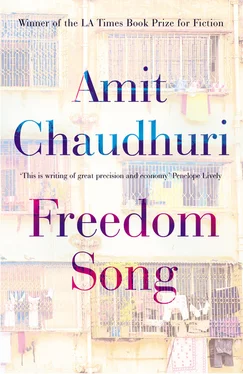She got up and walked to the basin and sprinkled her face with cold water from the tap. She would, before going to the doctor’s with her husband, prepare a snack — Chinese noodles with bits of vegetable and perhaps chicken in it — to amuse Piyu and Bhaskar and make herself happy. She called it ‘chow mein’. Her husband would demand some, and then finally have to beg for it, but she would deny him the noodles that evening because he was putting on weight and that was bad at his age. Her children would chant ‘Chow mein! Chow mein!’ as if the name made them hungry and also satisfied their appetites, and if her husband got a small ration upon a plate he would say that it was as good as, if not better than, what you got in restaurants. They would shovel up the noodles with tablespoons after they had put some of Han’s Chilli Sauce in it, thumping the end of the bottle with the palm of their hands until their palms became red and thick drops of the sauce, pale green, like something that flows in drains, had fallen out sluggishly. She had started making these steaming diversions — noodles and soups — playfully about ten years ago. And now she dialled the number of Mohit’s house. It was picked up by Mohit’s cousin, Sameer, who was three years younger than him.
‘Hello!’ he said, hoarse and loud. He sounded urgent and ready, as if he had been shouting all this time at the top of his voice.
‘Hello,’ said Bhaskar’s mother.
The female voice took Sameer aback. A note of wonder came to his voice.
‘Yes?’ he said softly (though he found it difficult to speak softly).
‘Can I speak to Mohit?’
There was a stunned silence. Then Sameer found his voice; he shouted at his normal volume—‘Ei, Mohit’ and Mohit’s voice in the background, slightly superior, and heavy after it had recently broken, wanted peevishly to know, ‘What is it?’ Sameer was like the boy who cried ‘wolf at every opportunity, and no one took his shouts seriously any more. But this time Sameer sounded vindicated, for he had important news: ‘It’s a girl, she wants to talk to you.’ There was silence again. Then, tense and prepared, Mohit’s voice came on the phone; and it was easy to visualize Sameer’s wide eyes, open mouth, and pricked-up ears behind it.
‘Yes!’
‘Can you recognize me?’
‘Are you sure,’ said Mohit in his knowledgeable way, ‘that you have the right number?’
‘So you don’t recognize me.’
‘Is this a joke?’ asked Mohit stiffly.
‘I’m Didimoni.’
There was an embarrassed sigh. Then, complainingly, Mohit cried:
‘Didimoni, why didn’t you say so to Sameer? This donkey said you were “a girl”.’ ‘Eh Ram!’ could be heard from Sameer in the background.
‘Never mind that. You two come today for chow mein at my house.’
So that was agreed. They would tell Mohit’s mother and all three would arrive together in the evening in an auto-rickshaw.
‘How’s the pain?’ asked Khuku. ‘It’s a lot less,’ said Mini. ‘Very little now.’
‘You should get a walking-stick, Mini,’ said Khuku. ‘It’ll be much easier for you. Your leg,’ and in Bengali the words ‘tor pa’ sounded so affectionate, as if she were referring to her leg as if it were her daughter, ‘won’t have to take the weight.’
‘No,’ said Mini, in her quiet but inflexible way, for she had already made up her mind about this, ‘no, Khuku, I can’t take a walking-stick everywhere. It’s so much trouble getting on to buses. I’ll only lose it.’
‘Lose it!. . But what of the limp?’ said Khuku. Then, ‘Anyway, that will go.’
It was so relaxing to have Mini in the house, for it was lonely for Khuku otherwise. But having Mini there made her feel less restless, and not want to go out all the time. It was enough for Khuku to see her sitting on an arm-chair in the hall, reading an old copy of Parashuram or Bonophul whose binding had its threads coming loose; she held the book considerately, which, in spite of its hard cover being out of joint, still had pages that turned like new ones. She had read these stories before, and was re-reading them now, as she always did when she had a free moment, deriving a great, calm pleasure from them — for no one, looking at the serious expression on her face, would have been able to deduce that these were extremely funny stories. The household continued in its normal way around her; and she sat there in one corner, disturbing no one, in her cotton sari, her feet in sandals, and the book resting in her lap. She had bathed and was ready before lunch, but never reproached anyone if lunch was late. It was not that she and Khuku had a great deal to talk about; but if Khuku wanted to complain about someone, or voice a worry, Mini listened, nodding her head gravely, or bursting into a short laugh, and after Khuku had finished, she would say, ‘He shouldn’t have said that,’ or ‘Oh, don’t bother about them.’ It was as if she understood Khuku perfectly.
They had been best friends since they were children. And, though she had married and had a child of her own, now a young man doing research in economics in California, Khuku had always been, from their first irresponsible schooldays in Sylhet, the childish one. Mini, though a few months younger at sixty-five, and by some curious distant relation a niece, had the older, calmer, more self-contained air; it was as if living alone so many years with her elder sister, teaching geography and Bengali at a school, gave her this centre of self-sufficiency which comforted Khuku. She was a judge’s daughter; in Sylhet, Khuku, whose father had died early, and who was the second youngest of seven undisciplined children, used to spend afternoons sucking pickles and chattering on the porch of Mini’s house: they were both given to bouts of frivolous laughter. Khuku hated boys; Mini went to sewing class without a needle. And Khuku — Khuku had gone on to become a mother, and Mini had become a schoolteacher — both facts were equally difficult to believe.
But Mini had her own shy, repressed side, which rarely came to light. For instance, after the luxury of bathing in Khuku’s house, she, in her unsmiling unostentatious way, splashed eau-de-cologne on herself; and she had her preferences in brassières, liking those that had small coloured flowers on their cups. But all this was her own secret, for then she covered herself in a large maternal white blouse and a neutral cotton sari. More than a year ago she had got arthritis, which had worsened till, with a deep breath, she had to prepare herself for her journey every morning to school, walking, step by step, tentatively down the stairs, leaning more upon her good foot, and then limping very slowly, but in a measured, symmetrical way, past the compound, through the gates, into the lane, onto the bus, and alighting finally near the school. The children in the compound had grown used to her new walk, for all things become slow with time, and her body too had almost got used to it. But she told Khuku, ‘It cut as if someone were putting salt upon it, Khuku re.’ ‘There is no solution but complete rest,’ declared Khuku, saying ‘complete rest’ in English. ‘And do you want to become a cripple?’ ‘No,’ said Mini quietly. Thus had Mini’s recuperation and long holiday begun in Khuku’s house.
Khuku had her own unworldly routines. She sang, to the accompaniment of her own harmonium, and her voice was still young and as tuneful as it had been when she was sixteen. Her voice was almost a miracle. In Sylhet and Shillong, it had shone, but, for one reason or another, life had passed by without fame coming to it. She could not be bothered. Now when people who lived in that Shillong were reminded of Khuku, they said remotely: ‘You mean Khuku Biswas, the one who used to sing?’ and they recalled a thin girl in a sari, her hair tied in a plait, standing on a stage before a mike, and outside the narrow steep hills of Shillong winding and winding, and Khasia children with red cheeks and high cheek-bones sitting by the roadside. ‘She got married and went to England, didn’t she?’ And here she was again, still sitting before the harmonium, still conscientious about her vocal exercises, though she had tired a little of the delicate beauty of Tagore songs and sang Nazrul and Atulprasad these days. Sometimes, indeed, contrarily, it seemed to her that Nazrul Islam was greater than Tagore, and she had begun to sing again a Hindu devotional kirtan which this Muslim poet had composed in a moment of ecstasy, which she had learnt as a child of seven:
Читать дальше












